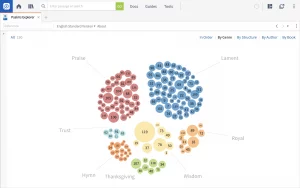We have been exploring the book of Psalms in our daily reading plan, enjoying these hymns and prayers of Israel. The collection that came together over hundreds of years of Israel’s history is comprised of 150 entries, written by numerous authors including King David. Though we have had an opportunity to become familiar the different types of psalms, our study has only scratched the surface of the contents of this great book.
a.) There are hymns of praise which pour forth worship and thanksgiving before the Lord. When we consider His glory and works, we come to the realization that God and He alone is deserving of our praise. There is joy in praising God. It is our duty as His creatures and a wonderful privilege granted by His grace. The Westminster Catechism asks, “What is the chief end of man? Man’s chief end is to glorify God and enjoy Him forever.” Psalms 19, 103, and 135 are examples from our study, and lead our hearts by example into joyful and reverent praise.
b.) Other psalms are prayers of desperation, cries for help in the midst of suffering and adversity. These psalms of lament focus one’s eyes upon God trusting in His compassion and care for His children. It is the Lord who provides strength needed to endure life’s trials. Many of these prayers begin with overwhelming anguish, but close with a sense of peace and even rejoicing. It is not that the psalmist’s circumstances had changed, but he could rejoice knowing the Lord was present. Psalms 22, 42, and 59 guide us similarly to share our sorrows with God.
c.) Some of the prayers offered in book of Psalms are prayers of confession in which the psalmist poured out his heart in repentance for sin. Even David, man of God that he was, stumbled badly and sinned against the Lord. But rather than try to justify his actions or ignore his offense, he bowed in humility and sought forgiveness and restoration. We looked at Psalm 32, and made reference to Psalm 51, which teach us that God is gracious and forgiving. When we have wandered away from the Lord in sinful disobedience, let our hearts also be grieved that we might return to God’s loving arms and find restoration in Him.
d.) The psalms are also filled with instruction, guiding us in the path of a righteous and holy life. Wisdom psalms wrestle with many of the deep questions of life. In them we are warned of the dangerous pitfalls men and women plunge themselves into if they are not watchful. Psalm 1, 14, 49, 73, 90, 127, 139, among others help make us wise and orient our lives in the right direction.
e.) Messianic psalms announce the coming of a Savior sent from God, and contain predictions about His ministry and work. Psalms 16, 22, and 72 are just a few examples which describe the death and resurrection of Jesus Christ, and celebrate the righteous King of the line of David. These psalms give evidence that Christ is who He claimed to be, the Savior and Son of God, because their prophecies find perfect fulfillment in Him.
Check out this video from the Bible Project for more information!
Review Questions:
- Having explored this book of the Bible, what do you appreciate the most about the Psalms? How have you found it helpful in your life and Christian walk?
- Do you have a favorite Psalm? What makes it special to you?
- What can we learn from the Psalms about prayer? Have the earnest and genuine petitions of the psalmists been helpful in your own prayer life?
- Many of the psalms express a passionate longing to know God and experience His presence. What does this tell us about the kind of relationship God desires us to have with Him?
- All of us experience some form of adversity during the course of our lives. What help and encouragement can we find from the prayers offered by those facing intense trials in the Psalms?
- What do we learn about worship from this book of worship and praise (both for our individual lives and as we meet together each Sunday as a body of believers)?


